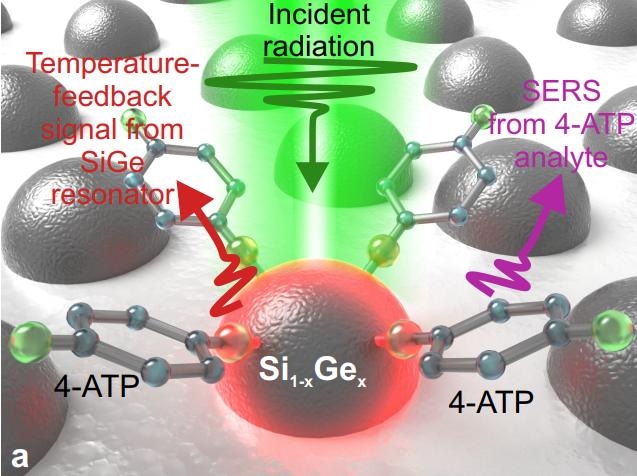Apr 2 2019
Researchers at Far Eastern Federal University (FEFU) together with collaborators from Far Eastern Branch of Russian Academy of Sciences (FEB RAS), ITMO University, and Swinburne University of Technology (Australia) have devised a technique for efficient mass production of silicon-germanium fully alloyed nanoantennas.
 Artistic representation of the alloyed Si1-xGex nanoparticles with 4-ATP molecules adsorbed on their surface. Isolated Mie nanoresonator is pumped with laser radiation resulting in SERS from the attached molecules as well as Stokes Raman yield related to Si1-xGex lattice phonons, which provides information on the local temperature of the molecule-nanoantenna system and corresponding spatial position the nanoresonator. (Image credit: FEFU press office)
Artistic representation of the alloyed Si1-xGex nanoparticles with 4-ATP molecules adsorbed on their surface. Isolated Mie nanoresonator is pumped with laser radiation resulting in SERS from the attached molecules as well as Stokes Raman yield related to Si1-xGex lattice phonons, which provides information on the local temperature of the molecule-nanoantenna system and corresponding spatial position the nanoresonator. (Image credit: FEFU press office)
Based on them, it is predicted that optical biosensory platforms and next-generation chemical sensors for quick and exact tracing of pollutions, explosives, viruses, and more at low concentrations will emerge. A related paper was published in Nanoscale.
To engineer all-dielectric (AD) optical nanoantennas, researchers put forward a simplistic technology on the basis of a temperature-assisted dewetting of commercial silicon-on-insulator (SOI) substrates at 800 °C in high vacuum. Such treatment of SOI substrate results in the formation of silicon nanodrops, which can be employed as optical nanoantennas that amplify the signals from different adsorbed molecules. Researchers have demonstrated that the deposition of Ge in the process of SOI dewetting enables alloyed nanoparticles to be produced with distinctive properties. Such nanoantennas enable identification of adsorbed molecules and also access and control of the local temperature with high resolution and accuracy in the process of measurement.
It’s very useful to know the local temperature because in the process of measurement both the nanoantennas and the adsorbed analyte molecules are exposed with intense laser radiation which causes their heating. At the same time, most organic molecules degrade at rather low temperatures around 130–170 °C, i.e. in the process of measurement one can simply burn them up before getting a useful signal. Such useful temperature-feedback modality cannot be realized with plasmonic nanoantennas commonly used to design biosensors. All-dielectric nanoantennas provide a reliable way to achieve this feature as the measured characteristics spectrum of the analyte molecules already contains all information required to determine the local temperature of the ‘nanoantenna-molecule’ system.
Aleksandr Kuchmizhak, Researcher, FEFU Center for Virtual and Augmented reality
By controlling the concentration of germanium in the alloyed silicon nanoparticles, one can tailor their properties; in particular, control their resonant optical characteristics, as well as the light-to-heat conversion efficiency. This is very useful for studying various chemical processes and reactions induced by laser radiation.
Evgeny Mitsai, Researcher, Institute of Automation and Control Processes and Institute of Chemistry, FEB RAS
The researcher pointed out that with all-dielectric nanoantennas, one can comprehensively study the temperature-mediated effects in laser-induced chemical reactions at high temporal resolution. Furthermore, all-dielectric nanoantennas remain chemically non-invasive, meaning their presence—unlike the presence of the plasmonic-based nanoantennas—does not cause any effect on the examined analytes and reactions.
So far, the mass production of all-dielectric nanoantennas was complicated. The widely used electron-beam lithography technique was time-consuming and very expensive. The technology suggested by FEFU researchers along with their colleagues from the FEB RAS, ITMO University, universities of Australia and Tunisia, enables overcoming this drawback.
The research was supported by the Russian Science Foundation (RSF), grant 18-79-10091.